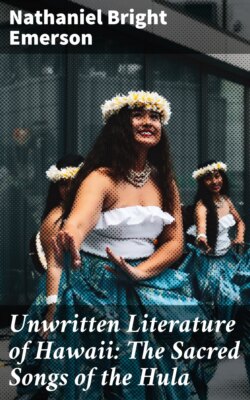Читать книгу Unwritten Literature of Hawaii: The Sacred Songs of the Hula - Nathaniel Bright Emerson - Страница 28
На сайте Литреса книга снята с продажи.
VI.--THE PASSWORD--THE SONG OF ADMISSION
ОглавлениеTable of Contents
There prevailed among the practitioners of the hula from one end of the group to the other a mutual understanding, amounting almost to a sort of freemasonry, which gave to any member of the guild the right of free entrance at all times to the hall, or halau, where a performance was under way. Admission was conditioned, however, on the utterance of a password at the door. A snatch of song, an oli, denominated mele kahea, or mele wehe puka, was chanted, which, on being recognized by those within, was answered in the same language of hyperbole, and the door was opened.
The verbal accuracy of any mele kahea that may be adduced is at the present day one of the vexed questions among hula authorities, each hula-master being inclined to maintain that the version given by another is incorrect. This remark applies, though in smaller measure, to the whole body of mele, pule, and oli that makes up the songs and liturgy of the hula as well as to the traditions that guided the maestro, or kumu-hula, in the training of his company. The reasons for these differences of opinion and of test, now that there is to be a written text, are explained by the following facts: The devotees and practitioners of the hula were divided into groups that were separated from one another by wide intervals of sea and land. They belonged quite likely to more than one cult, for indeed there were many gods and au-makua to whom they sacrificed and offered prayers. The passwords adopted by one generation or by the group of practitioners on one island might suffer verbal changes in transmission to a later generation or to a remote island.
Again, it should be remembered that the entire body of material forming the repertory of the hula--pule, mele, and oli--was intrusted to the keeping of the memory, without the aid of letters or, so far as known, of any mnemonic device; and the human mind, even under the most athletic discipline, is at best an imperfect conservator of literary form. The result was what might be expected: as the imagination and emotions of the minstrel warmed under the inspiration of his trust, glosses and amendments crept in. These, however, caused but slight variations in the text. The substance remains substantially the same.
After carefully weighing the matter, the author can not avoid the conclusion that jealousy had much to do with the slight differences now manifest, that one version is as authoritative as another, and that it would be well for each kumu-hula to have kept in mind the wise adage that shines among the sayings of his nation: Aohe pau ka ike i kau halau 56--" Think not that all of wisdom resides in your halau." 57
Footnote 56:(return) Sophocles (Antigone, 705) had said the same thing:[Greek: me nun en ethos pounon en sautô phorei ôs phes su, kouden allo, tout' orphôs echein]--"Don't get this idea fixed in your head, that what you say, and nothing else, is right."
Footnote 57:(return) Hatoa. As previously explained, in this connection halau has a meaning similar to our word "school," or "academy," a place where some art was taught, as wrestling, boxing, or the hula.
Mele Kahea
Li'u-li'u aloha ia'u,
Ka uka o Koholá-lele,
Ka nahele mauka o Ka-papala 58 la.
Komo, e komo aku hoi an maloko.
5
Mai ho'ohewahewa mai oe ia'u; oau no ia,
Ke ka-nae-nae a ka mea hele,
He leo, e-e,
A he leo wale no, e-e!
Eia ka pu'u nui owaho nei la,
10
He ua, lie ino, he anu, he ko'e-ko'e.
E ku'u aloha, e,
Maloko aku au.
